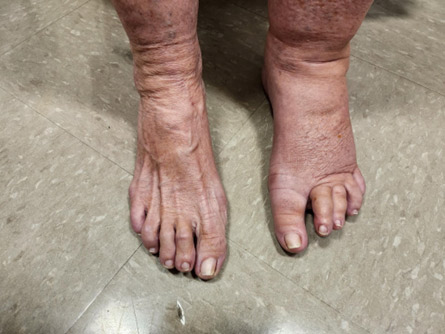Lymphedema
Lymphedema is a chronic medical condition characterized by the accumulation of excess lymphatic fluid, leading to swelling, usually in the arms or legs. This condition occurs when the lymphatic system, which plays a crucial role in maintaining fluid balance and filtering waste from the body, is impaired or damaged.

Key points about lymphedema include:
Causes: Lymphedema can result from various causes, including:
Primary Lymphedema: Caused by congenital abnormalities or developmental issues in the lymphatic system.
Secondary Lymphedema: Often occurs as a result of damage to the lymphatic system, commonly due to surgery, radiation therapy, infection, trauma, or cancer.
Symptoms: The primary symptom of lymphedema is swelling, which can range from mild to severe. Other symptoms may include a feeling of heaviness or tightness in the affected limb, limited range of motion, and discomfort.
Stages: Lymphedema is often classified into stages based on the severity of swelling and its impact on the affected limb.
Diagnosis: Healthcare professionals diagnose lymphedema based on a physical examination, medical history, and sometimes imaging studies. Lymphoscintigraphy is a diagnostic tool that can be used to assess lymphatic system function.
Management and Treatment: While there is no cure for lymphedema, various management strategies can help control symptoms and improve quality of life. These may include:
Compression Therapy: Wearing compression garments to reduce swelling.
Manual Lymphatic Drainage (MLD): A specialized massage technique to stimulate lymph flow.
Exercise: Gentle, targeted exercises to enhance lymphatic function.
Skin Care: Proper skincare to prevent infections in the affected area.
Prevention: Individuals at risk of lymphedema, such as those who have undergone cancer treatment or surgery involving lymph nodes, are often advised to take preventive measures. This may include avoiding trauma to the affected limb, practicing good skincare, and using compression garments when necessary.
There are surgical strategies for the management of lymphedema in select candidates. Early detection and appropriate intervention can help improve outcomes and enhance the individual’s quality of life. If you suspect to have lymphedema or are at risk, it’s important to consult with one of our vascular specialists for an accurate diagnosis and personalized treatment plan.